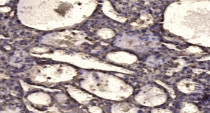ARG67122
anti-UQCRQ antibody
anti-UQCRQ antibody for IHC-Formalin-fixed paraffin-embedded sections and Human
Overview
| Product Description | Rabbit Polyclonal antibody recognizes UQCRQ |
|---|---|
| Tested Reactivity | Hu |
| Predict Reactivity | Ms, Rat |
| Tested Application | IHC-P |
| Host | Rabbit |
| Clonality | Polyclonal |
| Isotype | IgG |
| Target Name | UQCRQ |
| Antigen Species | Human |
| Immunogen | Human UQCRQ synthesized peptide |
| Conjugation | Un-conjugated |
| Alternate Names | UQCRQ; Ubiquinol-Cytochrome C Reductase Complex III Subunit VII; Complex III Subunit 8; UQCR7; QP-C; QCR8; Ubiquinol-Cytochrome C Reductase Complex Ubiquinone-Binding Protein QP-C; Ubiquinol-Cytochrome C Reductase, Complex III Subunit VII, 9.5kDa; Ubiquinol-Cytochrome C Reductase Complex 9.5 KDa Protein; Cytochrome B-C1 Complex Subunit 8; Complex III Subunit VIII; Ubiquinol-Cytochrome C Reductase, Complex III Subunit VII; Low Molecular Mass Ubiquinone-Binding Protein (9.5kD); MC3DN4; QPC |
Application Instructions
| Application Suggestion |
|
||||
|---|---|---|---|---|---|
| Application Note | * The dilutions indicate recommended starting dilutions and the optimal dilutions or concentrations should be determined by the scientist. |
Properties
| Form | Liquid |
|---|---|
| Purification | Purified by antigen-affinity chromatography. |
| Buffer | PBS (pH 7.4), 0.02% Sodium azide, 0.5% BSA and 50% Glycerol. |
| Preservative | 0.02% Sodium azide |
| Stabilizer | 0.5% BSA and 50% Glycerol |
| Concentration | 1 mg/ml |
| Storage Instruction | For continuous use, store undiluted antibody at 2-8°C for up to a week. For long-term storage, aliquot and store at -20°C or below. Storage in frost free freezers is not recommended. Avoid repeated freeze/thaw cycles. Suggest spin the vial prior to opening. The antibody solution should be gently mixed before use. |
| Note | For laboratory research only, not for drug, diagnostic or other use. |
Bioinformation
| Database Links | |
|---|---|
| Gene Symbol | UQCRQ |
| Gene Full Name | Ubiquinol-Cytochrome C Reductase Complex III Subunit VII |
| Background | This gene encodes a ubiquinone-binding protein of low molecular mass. This protein is a small core-associated protein and a subunit of ubiquinol-cytochrome c reductase complex III, which is part of the mitochondrial respiratory chain. |
| Function | Component of the ubiquinol-cytochrome c oxidoreductase, a multisubunit transmembrane complex that is part of the mitochondrial electron transport chain which drives oxidative phosphorylation. The respiratory chain contains 3 multisubunit complexes succinate dehydrogenase (complex II, CII), ubiquinol-cytochrome c oxidoreductase (cytochrome b-c1 complex, complex III, CIII) and cytochrome c oxidase (complex IV, CIV), that cooperate to transfer electrons derived from NADH and succinate to molecular oxygen, creating an electrochemical gradient over the inner membrane that drives transmembrane transport and the ATP synthase. The cytochrome b-c1 complex catalyzes electron transfer from ubiquinol to cytochrome c, linking this redox reaction to translocation of protons across the mitochondrial inner membrane, with protons being carried across the membrane as hydrogens on the quinol. In the process called Q cycle, 2 protons are consumed from the matrix, 4 protons are released into the intermembrane space and 2 electrons are passed to cytochrome c. |
| Cellular Localization | Membrane, Mitochondrion, Mitochondrion inner membrane |
| Calculated MW | 9 kDa |
| PTM | Acetylation, Phosphoprotein |
Images (1) Click the Picture to Zoom In






